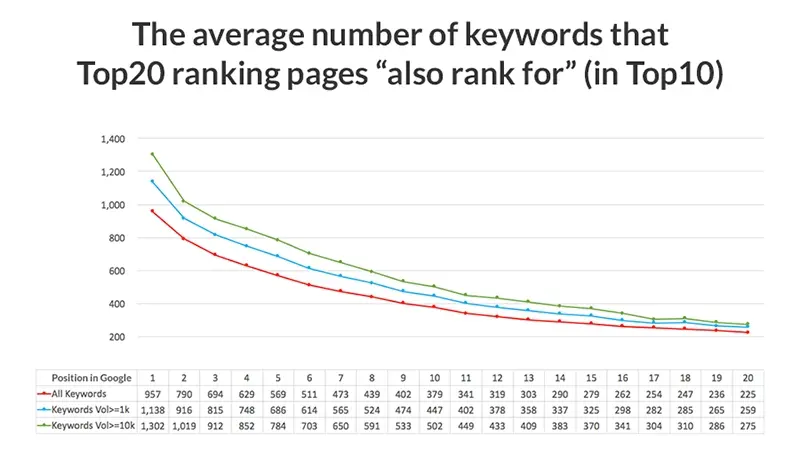
The answer to what is keyword research is, well, pretty much what it sounds like. It involves the process of identifying the words and phrases that people use to search for information, products, or services on search engines like Google. By understanding the keywords relevant to your industry and target audience, you can optimize your website content to rank higher in search engine results and attract more visitors.
What is Keyword Research and Why it Matters
Keyword research involves identifying and analyzing the terms and phrases your potential customers are likely to use when searching for information related to your business. It helps you gain insights into the language and preferences of your target audience, allowing you to tailor your content and marketing efforts accordingly. Effective keyword research can significantly improve your website’s visibility and increase the chances of attracting qualified leads.

The Importance of Keyword Research
According to Ahrefs, the average top-ranking page also ranks in the top 10 search results for nearly 1,000 other relevant keywords. The question of what is keyword research is an entry point to a fundamental aspect of SEO and digital marketing. By conducting thorough keyword research, you can:
- Increase Organic Traffic. By optimizing your website for relevant keywords, you improve its chances of ranking higher in search engine results, driving more organic traffic to your site.
- Understand User Intent. Keyword research helps you understand the needs and motivations of your target audience. By analyzing the keywords they use, you can align your content to provide valuable and relevant information.
- Enhance Content Relevance. By incorporating the right keywords into your content, you ensure that your website addresses the specific queries and concerns of your audience, making it more useful and engaging.
- Outperform Competitors. Keyword research allows you to identify opportunities and uncover gaps in the market. By targeting keywords with less competition, you can increase your chances of ranking higher and attracting more visitors.
Types of Keywords
Now that we’ve answered the question what is keyword research, let’s flush out the concept a little more with spme terms you’re bound to come across. When conducting keyword research, it’s important to understand the different types of keywords:
Head Keywords. These are short, generic terms that are highly competitive, such as “shoes” or “digital marketing.” While they have a high search volume, ranking for head keywords can be challenging.
Long-Tail Keywords. Long-tail keywords are longer, more specific phrases that have lower search volume but are highly targeted. For example, “best running shoes for marathon training” or “digital marketing tips for small businesses.”
Branded Keywords. These keywords include your brand name or variations of it, such as “Nike shoes” or “OpenAI language model.” They help drive traffic specifically looking for your brand.
LSI Keywords. Latent Semantic Indexing (LSI) keywords are terms related to your main keyword. They add context and depth to your content and help search engines understand the topic better.

Step-by-Step Guide to Keyword Research
To conduct effective keyword research, follow these steps:
Step 1: Define your goals and target audience
Understand your business objectives and identify the audience you want to attract with your content.
Step 2: Brainstorm relevant topics and themes
Generate a list of topics and themes related to your industry and target audience. This will serve as a starting point for keyword research.
Step 3: Use keyword research tools
Utilize keyword research tools like Google Keyword Planner, SEMrush, or Ahrefs to discover keywords related to your topics and analyze their search volume and competition.
Step 4: Analyze keyword competition and search volume
Evaluate the competitiveness of each keyword and assess its search volume. Choose keywords with a good balance of relevance, search volume, and competition.
Step 5: Refine your list and focus on long-tail keywords
Narrow down your keyword list and prioritize long-tail keywords that are more specific and have a higher chance of ranking.
Step 6: Consider user intent and searcher’s journey
Understand the intent behind each keyword and align it with the corresponding stage of the buyer’s journey. Create content that meets the needs and expectations of searchers.
Step 7: Incorporate keywords into your content
Create high-quality, engaging content that incorporates your target keywords naturally. Avoid keyword stuffing and ensure your content provides value to readers.
Step 8: Track and monitor keyword performance
Regularly monitor the performance of your chosen keywords using analytics tools. Adjust your strategy based on the data and insights you gather.
Best Practices for Effective Keyword Research
To maximize the benefits of keyword research, follow these best practices:
- Stay Updated. Keep up with the latest trends and changes in search engine algorithms to adapt your keyword strategy accordingly.
- Analyze Competitors. Research your competitors’ keywords to identify gaps and opportunities in your industry.
- Use a Variety of Tools. Don’t rely on a single keyword research tool. Explore different tools to gather a comprehensive set of data and insights.
- Focus on User Intent. Optimize your content for the intent behind the keyword rather than solely for search engines. Provide valuable and relevant information to your audience.
- Track and Optimize. Continuously track and analyze the performance of your keywords. Make data-driven decisions and refine your strategy over time.
Common Mistakes to Avoid in Keyword Research
While conducting keyword research, be mindful of the following mistakes:
Overlooking Long-Tail Keywords. Neglecting long-tail keywords can hinder your chances of ranking for specific, high-conversion searches.
Ignoring User Intent. Focusing solely on search volume without considering user intent can result in low-quality traffic and poor engagement.
Keyword Stuffing. Overloading your content with keywords can harm your website’s rankings and make it less appealing to readers.
Ignoring Analytics. Failing to track and analyze keyword performance can prevent you from identifying areas for improvement and missed opportunities.
An Evolving Landscape
Keyword research continues to evolve as search engines become more sophisticated. As voice search and natural language processing technologies advance, it is essential to adapt keyword research strategies accordingly. Understanding user intent and creating valuable content will remain key elements of successful SEO.
Wrapping Up
Asking what is keyword research means you had a pretty good idea about its importance to online success. Keyword research is a fundamental process in SEO that allows you to identify and target the right keywords to drive organic traffic to your website. By understanding the language and preferences of your audience, you can optimize your content to attract and engage potential customers. Remember to stay updated, track performance, and prioritize user intent to maximize the benefits of keyword research.















